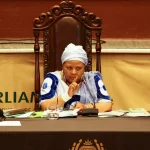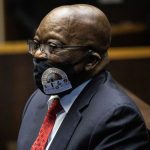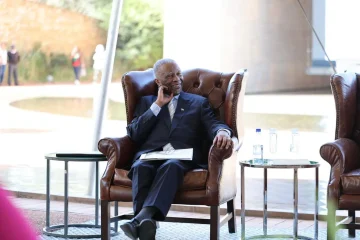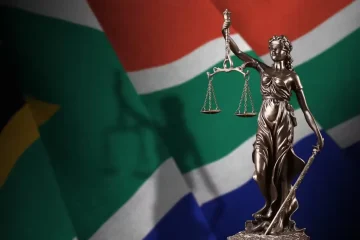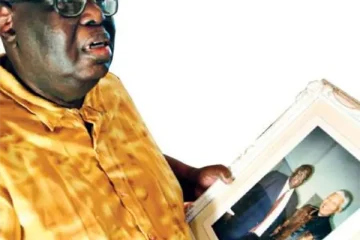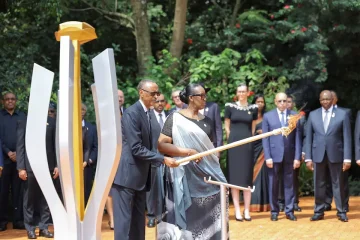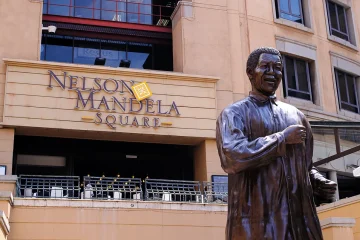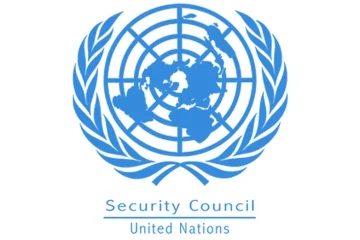MATHATHA TSEDU
THE SABC is not only our national public broadcaster, but it is also a National key point. As such security at the SABC is an important issue. In many countries, the security is done by the Defence Force and it is not unusual to find a military tank ala Gaza, parked outside a national broadcaster.
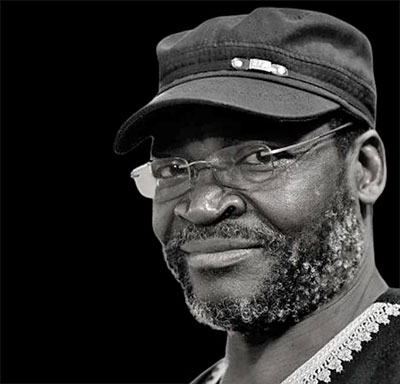
When I was appointed as a member of the Interim Board of the SABC by President Gedleyihlekisa Zuma in 2017, the corporation was almost on its knees.
Our arrival was not shorn of drama as the then Minister of Communications, Faith Muthambi, gave us letters in the middle of a session with the Parliamentary Portfolio Committee on Communications, effectively booting us out.
This was despite letters of appointment by Zuma. Muthambi said in the letters that we could not start operating until she had issued us with a concurring letter to that of the President. And here is the interesting part: she was not going to do so until we have had a full security vetting.
There are two types of security vettings, a desktop one where they look at debts and criminal records etc, which can take a day, or the full blast which even wants to know if you have had sex with a person of the same sex. This can take a minimum of six months to years. Our tenure as the Interim Board was for six months, so effectively our appointment would lapse whilst we sat at home waiting for Muthambi’s concurrence letter. She just wanted us out.
For whatever reason, she was moved by Zuma, and Ayanda Dlodlo came in and she decided to ask for the desktop version and we were back in business.
There was chaos which became clear during our orientation. Virtually everyone was acting in the senior posts.
There was hardly enough money to even pay the staff, and as one who had earlier worked there and also as a media person, I was accosted at every turn by staff wanting to know if they would be paid.
When the finance department made its presentation, my heart sank. We owed more than a billion. But it was to later turn out that even that bleak picture was not a true reflection. The Auditor General told us many invoices were not being loaded and when we asked the Divisional Finance teams why, we were told this had been an instruction by the executives to make the financial picture look less harrowing.
There are legal committees that the board must have and as only five members, we sat on multiple committees and each of us chaired more than one committee.
We decided to form a Special Payments Committee, which I chaired, where I would meet every month with the CFO and Divisional financial heads to look at how much money was in the kitty, and who could be paid. Salaries were first and then we would have a crying and begging session from each divisional head motivating why this or that of their invoices had to be paid.
Literally, people would cry, because they were at the coalface and were dealing with suppliers of content, equipment, catering and other services, which we had used, whose houses and cars were being dispossessed and where the kids had been thrown out of private schools. It was a monthly harrowing experience.
We were at the SABC virtually every day, and even then until very late at night, trying to sort out the mess. The capture of Supply Chain Management by Hlaudi Motsoeneng was easy to realise, he had moved his virtual PA from his office to head that section. Everything coming from that section was therefore suspect.
It became clear that if we were going to succeed in wresting control from the endemic and systemic corruption, we had to firstly get our own independent financial advisor who would look at all the figures presented to us before we acted, and secondly adopt what in technology they term disruptive approach.
The latter meant everything is suspicious until it is cleared. And there was the reason. We had a company allegedly collecting TV licence fees but were hardly doing so but being paid more than they brought in. This, whilst the SABC had a TV licence division with about 14 people sitting idle. We cancelled the contract immediately without following the rules. We were taken to court and won. And the internal licence division brought in more than the outsiders. I plead guilty to not following the rules, my Lady.
We had a glaring issue with the Gupta TV breakfast shows broadcast on SABC2, where the Guptas decided where and when it should happen and pocket the proceeds, whilst the SABC provided all the technical broadcast equipment, staff and channel time, and waited for it, got not a cent in return.
For example, the Guptas would decide the next breakfast is in Kimberly. The SABC office in Kimberly cannot do a show of that magnitude with multiple cameras just like in the studio at Auckland Park. That would mean technicians, all the outside broadcast equipment trucks, including one truck carrying a generator, would move, most a few days before to set up. They would be staying in hotels. All were paid by the SABC but with proceeds going to the Guptas.
We cancelled the one-page contract and were taken to court. The Guptas wanted more than R144 million as compensation for the one year of the contract that was still to run. That was the first time we had a view of how much they were making as they had refused to even share with us what they made per show. I plead guilty to not following the rules, my Lady.
We had found a company that was supposed to do websites for all platforms but the proposal had been done on a SABC laptop by the person who then presided when this company, without a Request For Proposals, had come and presented and was accepted. The company was paid R4,5 million the day after presenting. When we got there, only one website was functional. We stopped this. Guilty as charged, my Lady.
A Mr van Der Merwe who worked in Finance, queried an invoice from a prominent lawyer who was Motsoeneng’s permanent representative. Van der Merwe was just supposed to pay as the invoice had been cleared by others above him. He noticed one item for R100 000 marked Loan Repayment and sent the invoice back asking which loan was being repaid.
When the invoice was sent back, the lawyer removed the item and when pressed for reasons, explained that he had given Motsoeneng a personal loan and had been told to include it in the invoice. God Bless Mr van der Merwe.
There are many other examples but this brief background is important to understand the atmosphere in which we were operating when the security tender that was decided upon by the Gauteng South High Court landed before board.
A day before it came to the board, a whistleblower spoke to the Chair indicating that the security tender was “cooked”. The expiring security tender in which Mafoko was already providing services, had ended long before we arrived and had been extended several times and had now reached the point where it could not, legally, be extended further.
The last extension was expiring on the day the board looked at the tender. In other words, we had to make a decision on that day or the National Keypoint would not have security starting the following day. We couldn’t postpone the decision, and given our disruptive approach and the whistleblower, we knew that a tender for over R180 million couldn’t be clean.
The recommended company, Mjayeli, had initially failed in crucial areas such as firearms when the Bid Adjudication Committee(BAC) visited the premises.
They had somehow been brought back in and in the final scores, it pipped Mafoko by a fraction of a percent. It also underquoted Mafoko by another fraction, but we were informed this was irrelevant as discussions are held with whoever wins to reduce if they were higher.
A long discussion ensued, centred on what the Board’s role is when presented with a recommendation. Effectively, the question was whether the Bid Execution Committee’s(BEC) decision was final and we were a rubber stamp that should just agree, or whether it was a recommendation and the board was able to reject the recommendation.
The Legal Division was brought in to advise and we were told it was a recommendation and we could change it if we had valid reasons, and had applied our minds. We went into minute details of the scoring and found changes had been made that brought Mjayeli up. Mafoko had scored more on the BEE.
We felt we should go with Mafoko for our disruptive intentions and used the better BEE score as the reason, especially given that the difference was a fraction of a percent.
We asked the head of legal whether our reasons met the criteria of being valid and were told, in typical lawyer fashion, that in his opinion they did. That was good enough for us. We asked whether the discussions we had had met the threshold for “applying our minds”. Again, in his opinion, they did. We took our decision.
A member of the SCM spoke out and said what we were doing was wrong and even asked someone from the Treasury for an opinion and whoever it was sided with her. But in our opinion, she was from SCM and her stance was for us, further proof that someone wanted Mjayeli in, by any means necessary.
It didn’t matter to us. We had found a way to disrupt. All of these are in the Board Minutes.
It didn’t take long before our Chair started getting calls even from Parliament asking why we wanted to get the ANC in trouble with this decision.
When she discussed this with me we were both flabbergasted about how the ANC would come into the matter and be adversely affected. But the dice had been cast and we had done it with our eyes open. Guilty as charged my Lady. And as the judge in the matter concluded, we were technically wrong in doing so, but for me, I am prepared to plead guilty as charged because following the technical route would have meant continuing with corruption and with us now managing it.
We asked the Special Investigations Unit (SIU), (Yes We did) to come in and investigate a number of procurements, including this one. The SIU concluded that we were wrong to deviate from the BEC recommendation and that our reasons were not sufficient to warrant the deviation.
In the report, they indicated that they had investigated each of us, our financial position and records, phone records etc and found nothing untoward. This was not surprising because there couldn’t have been anything to find. It was not about favouring Mafoko, it was about rejecting what was a suspect recommendation that was brought to us at the last minute, effectively trying to force us to go with the BEC decision.
The SIU felt our decision was so egregious to warrant a recommendation that we be declared delinquent, and therefore not fit to sit on any board. Our decision did not result in any losses for the SABC as Mafoko provided the services to the satisfaction of the corporation.
In fact, as the matter dragged on in court, first Mjayeli withdrew, then the SABC withdrew and even asked the court not to stop the Mafoko contract in case the court’s decision happened whilst it was still on the premises.
And so, my Lady, this particular member of that board pleads guilty as charged, and given half a chance again and faced with the same set of facts, would do so again because the cumulative effect of the disruptive approach we took is the reason we still have an SABC today.

